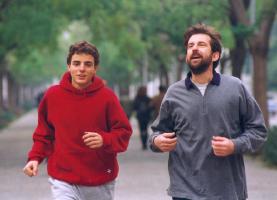Cannes Film Festival Awards Italy
by Anna Battista
Black and white.
Black and white were the colours of the Italian movies of Neo-Realism, so passionate, so angry, so painful, but also so tender.
Black and white were also the colours of a movie, shot 55 years ago, a movie that struck the world for one of the most touching frames of the history of cinema: a woman is running after a man hauled away by the Germans, we're in Rome and it's 1943-44. The woman screams and screams until she is gunned in the street. You're watching Anna Magnani starring as Pina in Roberto Rossellini's movie Roma Città Aperta (Open City) which won the Italian director the Grand Prix Award in Cannes in 1946.
Since then Italy was proud to present at the Cannes Film Festival real masterpieces: Italian actors and directors collected quite a few awards since 1946, but it was only in 1960, with Federico Fellini's La Dolce Vita, starring Anita Eckberg and Marcello Mastroianni, that the Cannes' panel decided to assign to an Italian movie the highest recognition, the Palme d'Or prize. The Palme d'or was successively awarded to Luchino Visconti's Il Gattopardo (1963), Pietro Germi's Signore e Signori (1966), Michelangelo Antonioni's Blow Up (1967), Francesco Rosi's Il Caso Mattei, Elio Petri's La classe operaia va in Paradiso (they both shared the award in 1972), Paolo and Vittorio Taviani's Padre Padrone (1977) and Ermanno Olmi's L'Albero degli Zoccoli (1978). Then the precious French award became a mirage for Italian directors: critics and journalists accused Italian cinema of passing through a deep crisis, marked by poor screenplays unable to stir any emotions in the ever demanding audience. But things seem to have changed.
Cannes 2001 will be in fact remembered as the film festival edition in
which Italian cinema was reborn and appreciated once more: apart from the
fact that Martin Scorsese presented there a documentary on Italian cinema,
the Cannes top prize was awarded to La Stanza del Figlio ("The Son's
Room"), directed and interpreted by Nanni Moretti. Simplicity and maturity
won: Nanni Moretti's movie is a heartrending tragedy settled in Ancona,
told in an everyday language which aimed at the heart of the audience with
a sincerity and realism that disconcerted everyone, even the Cannes jury,
among whom there was also Italian director Mimmo Calopresti, a jury headed
by actress and director Liv Ullmann. Among the other Cannes winners were
Michael Haneke's The Piano Teacher, which won the Grand Jury Prize and
gained the Best Actress and Best Actor prizes to Isabelle Huppert and
Benoit Magimel; Joel Coen's The Man Who Wasn't There and David Lynch's
Mullholan Drive which shared the prize for Best Director, and Danis
Tanovi's No Man's Land which won for Best Screenplay.
 The man who almost thirty years ago proclaimed of being "un autarchico",
Nanni Moretti, was visibly moved when he received the award, his first
Palme d'Or prize. The by now director, actor, producer and distributor
started his career in 1976 with the movie Io sono un autarchico, followed
by the short shots La sconfitta, Paté de bourgeois (both in 1973) and
Come parli frate? (1974) all taken in Super 8mm, the proof of an
independent mind prone to find his own art far away from the well trodden
paths of conventional cinema. The director's first appearance in Cannes is
dated 1979, when he presented Ecce Bombo, but success gradually arrived
in the following years when Sogni d'oro (1981) won the Grand Jury Award
at the Venice Film Festival and La messa e' finita (1985) received the
Silver Bear at the Festival of Berlin in 1986. The late '80s were marked by
Palombella Rossa (1989, produced by Moretti's Sacher Film house), what is
generally considered a mature movie, dealing with the identity crisis of a
leader of the Italian Communist Party, a theme which was later dealt with
also in Moretti's 1990 film-documentary La Cosa, in which the director
probes the consciences and the dilemmas of the left wing supporters in Italy.
The man who almost thirty years ago proclaimed of being "un autarchico",
Nanni Moretti, was visibly moved when he received the award, his first
Palme d'Or prize. The by now director, actor, producer and distributor
started his career in 1976 with the movie Io sono un autarchico, followed
by the short shots La sconfitta, Paté de bourgeois (both in 1973) and
Come parli frate? (1974) all taken in Super 8mm, the proof of an
independent mind prone to find his own art far away from the well trodden
paths of conventional cinema. The director's first appearance in Cannes is
dated 1979, when he presented Ecce Bombo, but success gradually arrived
in the following years when Sogni d'oro (1981) won the Grand Jury Award
at the Venice Film Festival and La messa e' finita (1985) received the
Silver Bear at the Festival of Berlin in 1986. The late '80s were marked by
Palombella Rossa (1989, produced by Moretti's Sacher Film house), what is
generally considered a mature movie, dealing with the identity crisis of a
leader of the Italian Communist Party, a theme which was later dealt with
also in Moretti's 1990 film-documentary La Cosa, in which the director
probes the consciences and the dilemmas of the left wing supporters in Italy.
 After producing Il Portaborse(1991), a film by Daniele Lucchetti, Moretti
directed and starred in Caro diario (1993), presented in Cannes in 1994
and awarded at the time with a prize for best director, whereas in the
following year Moretti starred in La seconda volta (1995) a film by Mimmo
Calopresti. Moretti went back to Cannes as director in 1998 when he presented "Aprile", but "La Stanza del Figlio" introduces a new and reinvented Nanni Moretti, as far as possible from his "autarchic" brother
of so many films ago. In the movie Moretti tells the story of an average
Italian happy family, father (Nanni Moretti), mother (Laura Morante), a son
(Giuseppe Sanfelice) and a daughter (Jasmine Trinca), whose lives revolve
around their serene universe made of work and school, until the sudden
death of the son afflicts the calmness of their lives and throws in a deep
crisis the father, a psychiatrist who finds himself unable to go on
working. Deeply different from his previous character, Michele Apicella in
Palombella Rossa, Moretti seems calmer, playing a role deeply human and
treating such a painful topic with great tact.
After producing Il Portaborse(1991), a film by Daniele Lucchetti, Moretti
directed and starred in Caro diario (1993), presented in Cannes in 1994
and awarded at the time with a prize for best director, whereas in the
following year Moretti starred in La seconda volta (1995) a film by Mimmo
Calopresti. Moretti went back to Cannes as director in 1998 when he presented "Aprile", but "La Stanza del Figlio" introduces a new and reinvented Nanni Moretti, as far as possible from his "autarchic" brother
of so many films ago. In the movie Moretti tells the story of an average
Italian happy family, father (Nanni Moretti), mother (Laura Morante), a son
(Giuseppe Sanfelice) and a daughter (Jasmine Trinca), whose lives revolve
around their serene universe made of work and school, until the sudden
death of the son afflicts the calmness of their lives and throws in a deep
crisis the father, a psychiatrist who finds himself unable to go on
working. Deeply different from his previous character, Michele Apicella in
Palombella Rossa, Moretti seems calmer, playing a role deeply human and
treating such a painful topic with great tact.
Nanni Moretti's movie was screened in Cannes right after the Italian elections which saw the right wing coalition prevailing over the left. From Cannes Moretti accused the left wing leader of the Rifondazione Comunista party Fausto Bertinotti of being responsible for the right wing victory not having joined the centre left coalition. Though criticising Moretti "the politician", in the end, Bertinotti recognised the merits of Moretti "the director" for a movie which is at present considered by the leftists as a work of art, the expression of the opposition who will be concerned in contrasting the new Silvio Berlusconi led government.
"Autarchic" director Moretti states that for now he has done his most mature movie, a movie made by somebody who has finally grown up. Writer and director Pier Paolo Pasolini stated he would never have grown up, since, in his opinion, existence never matured but preserved itself unripe as the days passed. What Nanni Moretti's fans hope is that the director will never be adult enough to lose his dreams, talent and art and that he will now be able to give Italy new movies and new successes. Meanwhile La Stanza del Figlio is being screened in Los Angeles followed by a retrospective of Nanni Moretti's movies.
Welcome to what France has already re-christened le Noveau Cinema de Italie.
Copyright (c) 2005 erasing clouds |
|